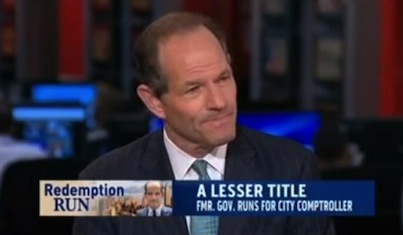Former New York Gov. Eliot L. Spitzer is ready to get back in politics, as is former congressman Anthony Weiner. You remember them — both had sex scandals that derailed them from their positions.
We’re all too eager to oust politicians who have been unfaithful, and the last few years have brought a spate of them: Schwarzenegger, Sanford, Edwards, Craig, Giuliani, McGreevey and, depending on your definition of unfaithful, Weiner.
Former California Gov. Arnold Schwarzenegger was already out of office when it was discovered that he had a son with a former family housekeeper, but many other politicians have resigned because of their indiscretions, including Weiner, after covering up a sexting scandal. 
But many of those former politicians have reinvented themselves and been accepted, if not embraced, by the public that was at first so quick to shame them — Bill Clinton and former South Carolina Gov. Mark Sanford among them. I’m not sure why we insist politicians resign in the heat of the moment when we’re so willing to accept their foibles, and repentance, after the fact.
(Meanwhile, women at the heart of sex scandals go on to pose in Playboy — including Spitzer’s mistress, Ashley Dupre. Erotic capital can only go so far).
Is it any different for a divorced politician?
We’re much more forgiving of a divorced politician than a cheating one. According to a Pew Research poll, just 11 percent said they’d be less likely to support a candidate who’s divorced while most, 85 percent, said it wouldn’t matter — although, interestingly, Republicans are more likely than Democrats to frown upon a candidate’s divorce. When it comes to adulterers, 46 percent say they’d have a hard time supporting a candidate who’s had an affair — up from just 39 percent in February 2007.
But a survey earlier this year indicated most of us are cool with a politician who has strayed — as long as it wasn’t with a prostitute (hello Spitzer?)
“Sometimes relationships work out, and sometimes they don’t. Politics seems to be one of those sorts of professions that wears on marriages,” says Yahoo writer Sevastian Winters. “We seek to judge the private lives of those who we choose from to lead, rather than the political agenda in play, and we fail to allow for humanity. Our leaders aren’t gods. They are men and women with public jobs who are as susceptible, if not more so, to difficulties in their private lives and their marital records have no bearing on political agenda.”
We just don’t like it when then they’re divorcing while in office. Former Nevada Gov. Jim Gibbons was the state’s first incumbent governor to lose his party’s primary in 2008; many believe his nasty divorce and allegations of infidelity may have had something to do with it.
“History shows that we Americans generally like to elect politicians who have a stable family life, or at the least the appearance of one: a spouse, perhaps a couple of children, etc,” writes Freakanomics journalist Stephen J. Dubner. “Among candidates running for national and statewide office, the spouse is a pretty standard prop at campaign stops.”
Some want to write off Spitzer’s sexual indiscretions as “ordinary sin.” Some see Weiner as “the lesser of two evils” in his mayoral race — guess a sexting politician is better than an “ideologue.”
All of which means sex is just sex after all.
- Should we forgive politicians like Weiner and Spitzer who have cheated?
- Is a cheating politician worse than a divorced one?
- And, is it really worse if a politician hires a prostitute?

















If they cheat or lie to their partner and family, the voting population is hardly likely to trust them to make honest and fair decisions.
We can discuss all we want about whether to forgive or not. But one fact does not change:
During the time the politician was cheating, they were lying to many people with a straight face, and multiple times. Some lies were small, “I’ll be working late at the office honey”, to more complex, “I’ll be leaving work early to go to xx, then I’ll hop a plane for business travel to yy, and be home at such and such”. All lies to hide their affaire. As they get away with it, lying becomes easier right? “Wow! I can just lie, then have this affaire, what fun!” If I elect a politician to office, I’d like to think that out and out lying is challenging for them at best. If they can lie to their partner, the person who is their most trusted in life, then how easy is it for them to lie to their constituents?